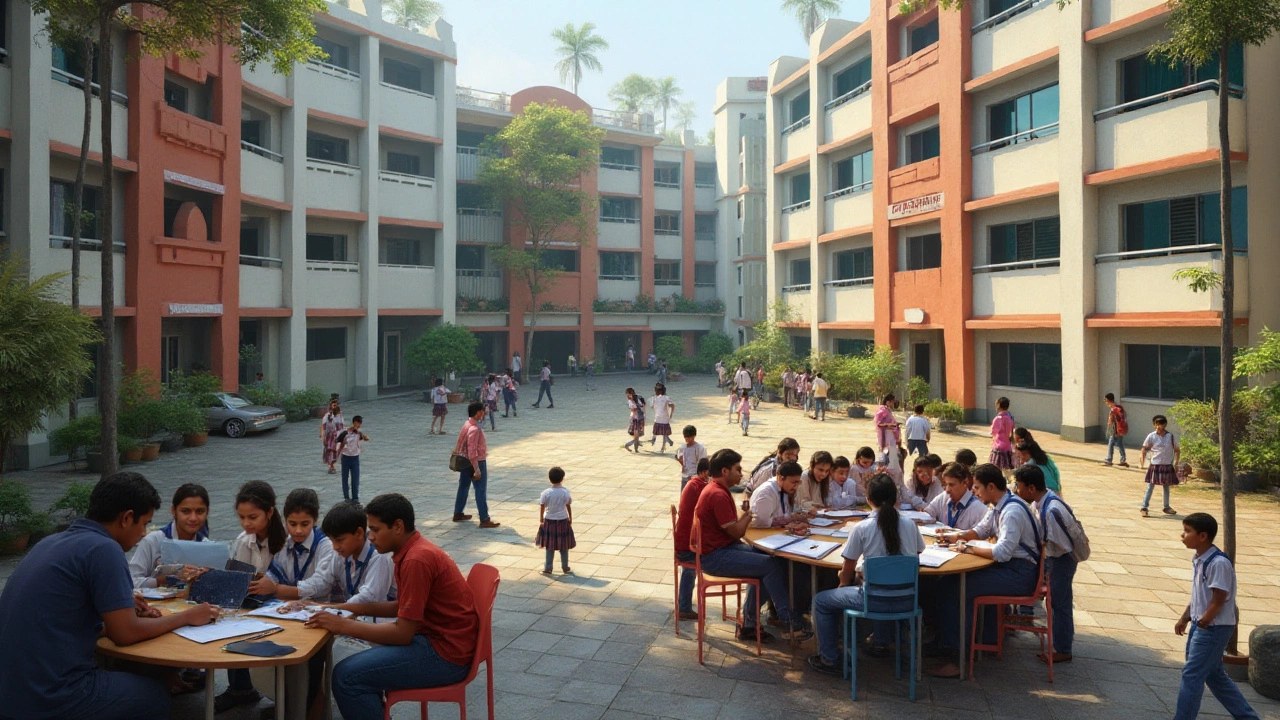
In the bustling landscape of Indian education, diploma courses have emerged as a valuable stepping stone for those looking to expand their professional repertoire. Offering a blend of practical skills and theoretical knowledge, these courses are designed to meet the ever-evolving demands of the job market.
Diving into the world of diplomas can seem daunting, but with the right information, you can navigate this path with ease. Whether you're a high school graduate aiming to specialize in a field or a professional eager to upgrade your skills, diploma programs can be your gateway to a brighter future.
Join us as we explore the nuances of pursuing a diploma in India—what options await you, how to apply, and why it could be the career boost you've been seeking.
- Understanding Diploma Courses
- Popular Fields of Study
- Eligibility Criteria
- Application Process
- Career Benefits
- Tips for Success
Understanding Diploma Courses
Diploma courses in India have gained substantial popularity as a viable educational alternative, providing both students and working professionals an opportunity to enhance their skills in a relatively short time frame. These diploma courses are typically short-term programs that focus extensively on practical training and skill development, offering hands-on experience that is often lacking in traditional degree programs. Available across a plethora of fields such as engineering, healthcare, management, and arts, these courses cater to diverse interests and career aspirations.
Essentially, a diploma course bridges the gap between academic aspirations and practical employment requirements, making it an attractive choice for those looking to enter the workforce quickly. Although diploma curriculums might vary across institutions, they generally aim to equip students with job-oriented skills that align with industry standards and expectations. In fact, according to a study published by The Indian Journal of Vocational Education, students from colleges offering diploma courses have a higher employability rate by approximately 40% compared to those from broader academic courses.
One of the appealing factors of undertaking diploma courses India is their flexibility in terms of duration and learning modes. While traditional diplomas range from six months to two years, many institutes now provide accelerated programs and online certification, offering the same quality education remotely. This flexibility is particularly beneficial for working professionals who wish to balance their education with their existing careers. Additionally, the affordability of diploma courses makes them a cost-effective alternative to longer degree courses, particularly in a country where education costs can be a burden for many families.
When it comes to eligibility for these courses, criteria may differ. Generally, admissions require a minimum qualification of a 10th or 12th-grade pass certificate, depending on the level of specialization desired. Some advanced programs may demand bachelor's degree qualifications or work experience. This brings us to a noteworthy observation made in a report by the Ministry of Education, stating that over 25% of diploma students in India come from rural areas and underprivileged backgrounds, making this education pathway a significant contributor to the socio-economic development of urban and rural India alike.
The significance of diploma courses in the Indian education scenario cannot be overstated. They not only promise immediate employability but also serve as a stepping stone for further education, including advanced diploma programs and even degree courses. This dual benefit adds a layer of versatility for students who, after gaining work experience, may choose to pursue higher education to advance their career prospects. As noted by the renowned educationalist Dr. Rajeev Kumar,
"The assurance of a practical skill set and the ability to adapt makes diploma courses a strong foundation for both careers and ongoing education."
Popular Fields of Study
India, with its diverse educational landscape, offers a plethora of diploma courses that cater to a wide range of interests and career goals. Diploma courses India span various industries, providing students and professionals the opportunity to specialize in fields they are passionate about. One of the most sought-after areas is technology. With IT hubs like Bangalore and Hyderabad setting the pace, diplomas in computer engineering, software development, and information technology are always in high demand. These programs are specifically designed to equip students with the technical skills required to thrive in the fast-paced tech world, often leading to lucrative job opportunities with top tech firms.
Another notable field is management. Given India's booming economy, diplomas in business management, human resources, and project management are gaining traction. These courses offer insights into the intricacies of managing an organization, preparing students for roles that require strategic thinking and leadership abilities. India's retail and hospitality sectors are also contributing significantly to this trend, with diplomas targeted at those aiming to climb the management ladder in these industries.
The Times of India highlights, "Diplomas in vocational fields have seen a notable surge in enrollment as students aim for quick placement in the job market."
The healthcare sector is another area buzzing with opportunities. With India's increasing focus on medical innovation and healthcare accessibility, diplomas in nursing, medical laboratory technology, and pharmacy are highly valued. These courses provide hands-on training and are tailored to meet the demands of hospitals and clinics. Students gain practical experience essential for their future roles, often leading to immediate employment upon completion of their studies.
For those inclined towards creative pursuits, India offers diploma programs in fields like graphic design, fashion technology, and animation. With the rapid digitization and cultural renaissance across the nation, these creative courses allow students to explore their artistic talents and apply them in practical scenarios. Fashion hubs like Mumbai and Delhi bolster these programs, providing ample industry exposure and chances to work with leading designers and brands, creating a canvas for exciting career growth.
Emerging Fields
In recent years, new courses have surfaced in response to evolving industry demands. One such domain is environmental science and sustainability, where diplomas focus on sustainable development, ecology, and resource management. As the world turns increasingly towards sustainability, graduates with diplomas in these fields are sought after for their forward-thinking approach and ability to contribute to important environmental projects. Similarly, the advent of artificial intelligence and Big Data has propelled the need for diplomas in data management and AI, offering participants the chance to specialize in areas that are shaping the future of global industries.
| Field | Popular Diploma Programs |
|---|---|
| Technology | Computer Engineering, Software Development |
| Management | Business Management, Human Resources |
| Healthcare | Nursing, Medical Laboratory Technology |
| Creative Arts | Graphic Design, Animation |
| Emerging Fields | Environmental Science, AI & Data |

Eligibility Criteria
Embarking on a journey through the diverse world of diploma courses India involves understanding the basic eligibility norms established by educational institutions. These criteria not only align with the course requirements but also ensure that students and professionals possess the foundational knowledge needed to succeed. Generally, the eligibility for diploma courses varies depending on the field of study—but some commonalities can be noted across the board.
The most prevalent requirement for enrolling in diploma courses is the successful completion of secondary education, typically class 10 or 12, depending on the demand of the specific course. For example, technical diplomas, which are quite popular due to the growing technological landscape, often require completion of class 12 with a science background, while others in arts disciplines may only necessitate a class 10 qualification.
Moreover, specific courses may set a minimum percentage cut-off as part of their selection criteria. In more specialized fields like health sciences or management, additional entrance exams might be mandatory.
Dr. Asha Sreedhar, an education consultant, once stated, "The bar is set high to sift through innumerable applications and choose candidates who are truly passionate about their chosen field." This sentiment holds true especially when competition is stiff, and institutions aim to foster an environment of excellence.
International students seeking a diploma in India must meet similar academic criteria but also need to ensure they possess valid documentation, including visas and recognition of their previous education. Another essential aspect often overlooked is the language proficiency that some institutions may require. English, being the medium of instruction in most diploma courses, mandates proficiency tests for non-native speakers.
On occasion, eligibility also hinges on the professional experience of the candidate. Certain advanced diplomas, particularly in management and technology, favor candidates with a few years of work experience since they bring practical insights to theoretical learning. This not only enhances their learning curve but also elevates classroom discussions, fostering a holistic learning environment.
Here's a quick breakdown that may guide you through the general eligibility landscape:
- Completion of class 10 or 12, often with specific subject requirements.
- Minimum percentage cut-offs where applicable.
- Relevant entrance exams for competitive courses.
- Language proficiency for non-native speakers.
- Professional experience for certain advanced diplomas.
In some cases, statistical data provide insights into the percentage of students qualifying for these courses and the intake capacity of institutions. Such information can be crucial for prospective students in making informed decisions. Armed with this foundational knowledge, aspiring candidates can approach their application process with confidence and clarity, paving a smooth path to their desired educational goals in Indian diplomas.
The Application Process
Navigating the application process for diploma courses in India is a critical step toward embarking on a rewarding educational journey. Understanding what is required can set the foundation for a successful application. The process usually begins with research, where prospective students need to identify institutions offering their desired diploma. This involves visiting college websites, attending education fairs, and speaking with advisors to get a feel for what each program offers. Once you're well-informed, the next move is to gather application materials.
Comprehensive documentation is key. Aspiring students must often provide proof of their previous academic achievements, such as high school transcripts or any prior certifications. Personal identification documents are also necessary, alongside passport-sized photographs. Many institutions require a statement of purpose or personal essay explaining your interest in the field of study, which provides an opportunity to showcase your passion and dedication.
Application timelines vary across institutions, so adhering to deadlines is crucial. Most colleges have streamlined online application portals, making it convenient to submit your application remotely. It is vital to ensure that all required fields are completed accurately to avoid delays. An application fee might also be required, and this non-refundable fee needs to be paid through the methods stipulated by the institution.
Upon submission, the waiting game begins. Some colleges might notify applicants within weeks, while others could take several months. Keep track of application dates, as some institutions adhere to specific admission rounds. If you are required to participate in an entrance exam specific to your chosen field of study, ensure that you are thoroughly prepared.
"A good application is the foundation of a great educational journey," notes Dr. Sudhir Choudhary, Education Consultant. "Engage with the process willingly and be thorough with your preparations."
Finally, once you receive acceptances, it is important to review the offer letters carefully. Understand the terms and decide based on factors like curriculum, faculty, campus life, and future career opportunities. Once you have chosen the right fit, confirm your acceptance accordingly. This will often require an initial deposit to secure your place. From this point onward, your journey toward acquiring a diploma in India begins in earnest, setting you on a path toward both personal and professional growth.

Career Benefits
Pursuing a diploma course in India offers numerous career advantages that attract fresh graduates and experienced professionals alike. One of the most significant benefits is the tailored curriculum designed to equip students with industry-specific skills. These courses often focus on practical applications related to real-world scenarios, setting them apart from traditional degree programs that may lean heavily towards theoretical knowledge. This practical approach prepares learners to step directly into the workplace, making them prime candidates for job opportunities that require hands-on expertise.
A unique aspect of diplomas is their versatility. Whether you're interested in technical fields like engineering or creative areas like design, there's a diploma to match your interests. This adaptability is crucial in a rapidly changing job market, where new roles and skill demands emerge regularly. Completing a diploma allows learners to quickly shift their career focus and pivot into emerging fields without committing to several years of formal education.
Diploma holders often find themselves in high demand due to these specialized skills. Companies appreciate the focused training and ability to quickly adapt to specific job roles, which can translate into competitive salaries. In fact, studies have shown that individuals with diplomas earn significantly more in their early careers compared to those without any post-secondary qualifications. Moreover, diplomas often serve as a stepping stone to advanced education. Many institutions offer credit for completed diploma courses, enabling students to transition smoothly into degree programs if they choose to further their studies.
Career advancement is another compelling reason to consider a diploma. These programs are not only for newcomers to a field but are also valuable for professionals seeking to enhance their qualifications. Upgrading through a diploma can lead to promotions or opportunities in management positions. For instance, a technician in a healthcare facility could pursue a diploma in medical administration, opening doors to supervisory roles. As quoted by noted career guide expert, "A well-chosen diploma can be the catalyst for career growth, providing not only new skills but also the confidence to climb the career ladder."
A practical benefit of diploma courses is their duration. Generally, they are shorter than degree programs, ranging from several months to two years. This compressed timeline means less time spent away from the workforce, allowing for a quicker return to employment with new skills in hand. This speedy turnaround is particularly appealing for those already working and seeking skill improvements without a long break from their careers.
Networking Opportunities
In addition to direct career benefits, diploma programs offer rich networking opportunities. Students often find themselves learning alongside peers who are already in the industry, creating a valuable networking platform. This environment encourages the exchange of ideas and cultivates professional relationships that can prove advantageous in future job seeking. Interactions with instructors who are usually esteemed industry professionals can also provide insights and mentorship.Tips for Success
Pursuing a diploma course in India can be a transformative journey, but like any educational venture, success hinges on several factors. First and foremost, commitment to learning is perhaps your most powerful ally. Engage wholly with your coursework and embrace both the challenges and victories you encounter along the way. Setting clear goals before you begin helps anchor your focus. These aspirations, whether they are a specific career role or skill set you want to master, function effectively as the compass guiding your efforts. This clarity can powerfully steer your study habits and decision-making, ensuring you stay on track even when the going gets tough.
Networking plays a pivotal role in any educational experience, and your diploma program should be no different. Take the initiative to connect with your peers, instructors, and industry professionals. These relationships can provide invaluable insights, support, and openings for practical experiences such as internships or projects. Consider participating in seminars, workshops, and online forums where you can exchange ideas and stay updated on trends related to your field. Trust the process—talent is nurtured not in isolation, but through collaboration and shared experiences, as emphasized by Michael Jordan, "Talent wins games, but teamwork and intelligence wins championships."
Time management cannot be overstated, especially given the typically intensive nature of Indian diploma courses. Drafting a balanced schedule that allows ample time not just for classes, but also for studying, relaxing, and managing other responsibilities, is crucial. A practical approach could involve setting daily, weekly, and monthly goals. Breaking large tasks into smaller, manageable chunks can help avoid overwhelm, making it easier to assess progress and adjust plans as necessary.
The landscape of education today demands adaptability. While pursuing a diploma in India, staying open to new methods of learning, such as digital tools and resources, can enhance your understanding and retention of complex concepts. Incorporate various learning mediums, such as videos, podcasts, and interactive modules, into your study routine to keep your sessions engaging and diverse. Adopting a growth mindset will not only aid you in your studies but also prepare you to tackle real-world scenarios with confidence.
Financial planning is another cornerstone of success in diploma courses. Understanding the financial requirements ahead of time—tuition, materials, and any other associated costs—allows you to plan accordingly. Investigate if there are scholarships, financial aid, or part-time work opportunities at your institute. Being fiscally prepared reduces stress, enabling you to focus more intently on your academics without being bogged down by financial worries.
Your approach to seeking feedback greatly influences your growth during a diploma program. Constructive feedback is an opportunity, providing specific insights into areas of improvement. Regularly request feedback on assignments, projects, and classroom participation, considering it a tool for sharpening your skills and knowledge.
